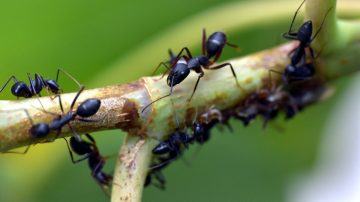Michael Schulson in Undark:
 GIVEN THAT SHE infects ant colonies with deadly pathogens and then studies how they respond, one might say that Nathalie Stroeymeyt, a senior lecturer in the school of biological sciences at the University of Bristol in the U.K., specializes in miniature pandemics. The tables turned on her, however, in March: Covid-19 swept through Britain, and Stroeymeyt was shut out of her ant epidemiology lab. The high-performance computers she uses to track ant behavior sat idle, and only a lab technician — deemed an essential worker — was permitted to tend to the lab’s hundreds of black garden ant colonies, each housed in its own plastic tub.
GIVEN THAT SHE infects ant colonies with deadly pathogens and then studies how they respond, one might say that Nathalie Stroeymeyt, a senior lecturer in the school of biological sciences at the University of Bristol in the U.K., specializes in miniature pandemics. The tables turned on her, however, in March: Covid-19 swept through Britain, and Stroeymeyt was shut out of her ant epidemiology lab. The high-performance computers she uses to track ant behavior sat idle, and only a lab technician — deemed an essential worker — was permitted to tend to the lab’s hundreds of black garden ant colonies, each housed in its own plastic tub.
With governments across the world now encouraging people to maintain space between one another to prevent the spread of the virus, Stroeymeyt drew parallels with her insect subjects. The current guidance on social distancing “rung familiar,” Stroeymeyt said, “because I’ve been seeing it among the ants.”
Such insights are at the heart of a burgeoning field of insect research that some scientists say could help humans imagine a more pandemic-resilient society. As with humans, fending off disease can be a tall order for social insects — a category that includes termites, ants, and many species of bees and wasps. Insect workers swap fluids and share close quarters. In most species, there is heavy traffic into and out of the nest. Some ant colonies are as populous as New York City.
More here.
